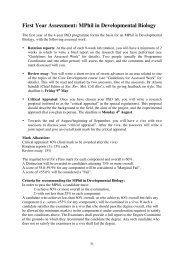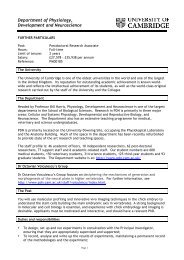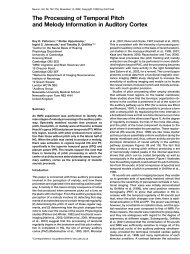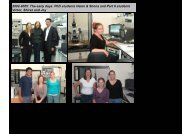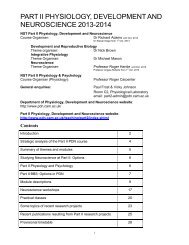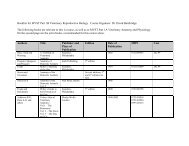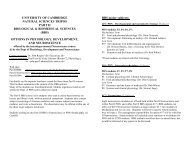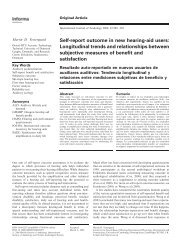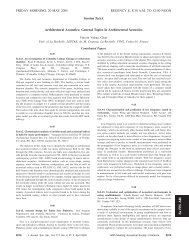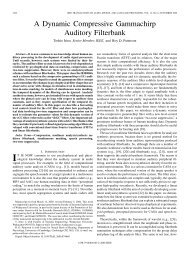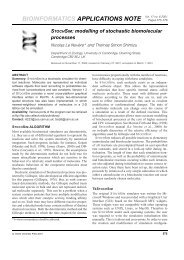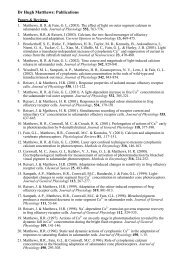part ii physiology, development and neuroscience - Department of ...
part ii physiology, development and neuroscience - Department of ...
part ii physiology, development and neuroscience - Department of ...
Create successful ePaper yourself
Turn your PDF publications into a flip-book with our unique Google optimized e-Paper software.
INTRODUCTION<br />
Part II in Physiology, Development <strong>and</strong> Neuroscience <strong>of</strong>fers a broad range <strong>of</strong> teaching <strong>and</strong> project<br />
opportunities covering the full spectrum <strong>of</strong> interests within the De<strong>part</strong>ment. Our Part II teaching is<br />
organised into modules to <strong>of</strong>fer the greatest possible flexibility to design a course to match your own<br />
interests. We also <strong>of</strong>fer a joint Part II course in Physiology & Psychology.<br />
The De<strong>part</strong>ment <strong>of</strong> Physiology, Development <strong>and</strong> Neuroscience is concerned with material central to the<br />
life sciences. It addresses questions about the way that cells, tissues <strong>and</strong> organs develop <strong>and</strong> function<br />
in people <strong>and</strong> animals. Physiology, Development <strong>and</strong> Neuroscience are broad but interlinked subjects<br />
with many different areas <strong>of</strong> specialisation. A good grounding in these subjects opens the way to a wide<br />
variety <strong>of</strong> careers: these range from those where you use your knowledge directly, to those in which the<br />
underst<strong>and</strong>ing you will acquire <strong>of</strong> complex organisms is put to work less directly, such as in managing<br />
equally complex human organisations. The knowledge <strong>and</strong> skills gained on this Part II course will<br />
<strong>part</strong>icularly provide a valuable basis for the practice <strong>of</strong> human <strong>and</strong> veterinary clinical medicine, where a<br />
critical underst<strong>and</strong>ing <strong>of</strong> scientific advances are essential in designing <strong>and</strong> evaluating new treatments.<br />
Many <strong>part</strong>s <strong>of</strong> the course concentrate on important research areas where recent discoveries have<br />
changed our perception <strong>of</strong> disease <strong>and</strong> have posed new questions to be answered. The sixteen<br />
modules are organised into three themes, allowing you to spend the whole <strong>of</strong> your third year studying in<br />
depth Development & Reproductive Biology, Integrative Physiology or Neuroscience. Alternatively,<br />
those <strong>of</strong> you seeking a broader overview can select to follow a more general course, combining modules<br />
across these themes.<br />
One major benefit <strong>of</strong> studying Part II Physiology, Development <strong>and</strong> Neuroscience will be in gaining an indepth<br />
knowledge <strong>of</strong> key core areas <strong>of</strong> the life sciences. You will also gain important knowledge <strong>and</strong><br />
skills that graduates in any subject should these days have. These skills include:<br />
o critically assessing information you read or hear<br />
o keeping accurate records<br />
o writing reports <strong>and</strong> reviews, <strong>and</strong> effectively presenting <strong>and</strong> communicating your ideas<br />
o efficiently using libraries <strong>and</strong> information databases<br />
o selecting appropriate statistical procedures to verify hypotheses<br />
o using modern computer s<strong>of</strong>tware<br />
Teaching <strong>of</strong> the course involves most members <strong>of</strong> staff <strong>of</strong> the De<strong>part</strong>ment <strong>of</strong> Physiology, Development &<br />
Neuroscience <strong>and</strong> is supplemented by invited specialists from across the University, <strong>and</strong> from the Royal<br />
Postgraduate Medical School, University College London, the National Hospital for Nervous Diseases in<br />
London, <strong>and</strong> Addenbrooke’s <strong>and</strong> Papworth Hospitals. We also <strong>of</strong>fer a growing number <strong>of</strong> modules<br />
taught in collaboration with other De<strong>part</strong>ments, allowing us to call upon the broadest range <strong>of</strong> expertise<br />
within the University.<br />
Taking Part II in Physiology, Development & Neuroscience gives you the many advantages <strong>of</strong> a home<br />
base on the Downing Site. You will immediately feel an important contributing <strong>part</strong> <strong>of</strong> the vibrant<br />
research community. The social cohesion with your fellow Part II students will be enjoyable <strong>and</strong> valuable<br />
throughout the year <strong>and</strong> your academic <strong>and</strong> other questions can be informally dealt with when you<br />
happen to meet members <strong>of</strong> staff about the De<strong>part</strong>ment. The De<strong>part</strong>ment has numerous resources<br />
available to you though the year, including a well-stocked library, where you will be able to find many <strong>of</strong><br />
the books <strong>and</strong> journals you need in a single place. The De<strong>part</strong>ment also maintains computers <strong>and</strong><br />
printers, which you will be able to access both in the library <strong>and</strong> a dedicated Part II computer room. Our<br />
friendly <strong>and</strong> supportive Part II technical staff will become well known to you <strong>and</strong> our excellent tearoom,<br />
frequented by all members <strong>of</strong> the De<strong>part</strong>ment, further fosters cohesion.<br />
The scope <strong>of</strong> the course<br />
You will probably already have an overview <strong>of</strong> some or all <strong>of</strong> <strong>physiology</strong>, <strong>development</strong> <strong>and</strong> <strong>neuroscience</strong><br />
from your Part I courses <strong>and</strong> we will therefore build upon these basics by <strong>of</strong>fering an in depth course in<br />
which we will not attempt to cover the whole <strong>of</strong> these subjects. We <strong>of</strong>fer teaching on topics <strong>of</strong> current<br />
interest that we discuss to a much higher level than in Part I. This means that you can devote your time<br />
to those areas you find <strong>part</strong>icularly interesting. While we expect that the majority will have done the Part<br />
IA <strong>and</strong> IB courses in <strong>physiology</strong>, neurobiology or <strong>development</strong>al <strong>and</strong>/or reproductive biology, we will also<br />
2



